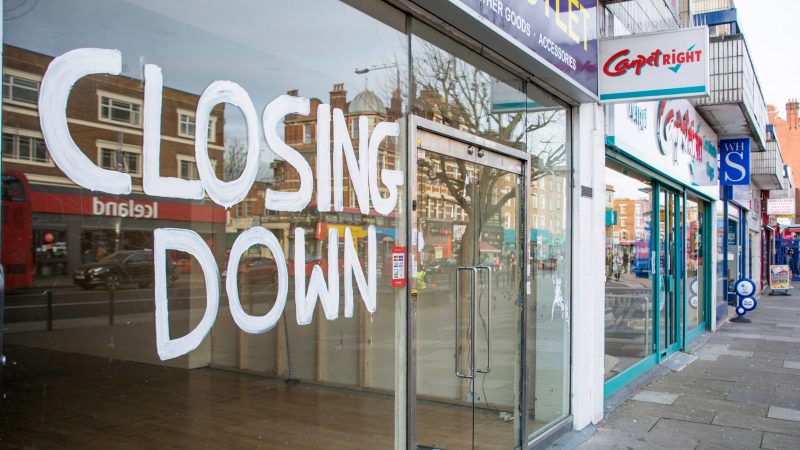
Businesses are closing down all around us. The security and confidence necessary to keep going is just not there anymore. Business death rates have now exceeded business birth rates for the last five quarters, a trend that has never been recorded before. Behind those statistics are thousands losing their livelihoods – and I’m one of them. I wrote for LabourList a year ago about how the recovery wasn’t happening and that rising costs, including energy, were making it impossible to keep going.
The number of businesses closing for good is another example of how Conservative economic policy does not live up to the challenges that we face. After years of cuts and austerity, the services and infrastructure we all rely on are just not there. We lurch from one crisis to another with no plan and literally no industrial strategy.
The business ‘energy price guarantee‘ is only guaranteed for six months; further support is dependent on a review by Jacob Rees-Mogg. The terms of this review haven’t been announced. Businesses are faced with going begging bowl in hand to a minister who had to be dragged to parliament to announce what little there is on offer. We all know that the decisions will be made based on proximity and access to Tory VIP lanes as all their other business polices are decided.
At the Labour Party conference, I was proud to be the Labour Business delegate, while the rest of the Labour Business team was busy assisting with roundtable and panel events with business people both within the party and externally. All the conversations that we had at conference showed that the reason voters are switching to Labour is not just because this government is the worst we’ve ever seen – but also because Labour has the right attitude and the right policies to lead us out of the crisis, including its business policies.
Trickle-down economics does not work. It is a failed policy that does not lead to growth, because fair distribution is essential to long-term, sustainable growth. Trying the same policy yet again won’t work, even if we all close our eyes and believe. The businesses at conference were clear that, after years of austerity and lurching from one crisis to another, real, sustainable growth can only be achieved from the bottom upwards and requires firm foundations, including investment in our social infrastructure. Policies covering a whole range of issues, from adult skills to childcare, are needed to provide stability and the growth that we want to see.
The speeches from the shadow frontbench delivered on many of the issues that are being raised by business. Some polices have been Labour polices for a while, such as updating business taxation including business rates. Some were headline-grabbing such as Great British Energy, which will allow us to take more control of energy pricing, supporting both domestic and commercial customers with their energy bills. It will also help enable the green transition that is now beyond a necessity. Jonathan Reynolds also set out Labour’s industrial strategy, and the party’s proposal of a ‘national wealth fund‘ has been widely praised by business organisations.
There were various policies that show that Labour is listening to a wide range of voices on business. Angela Rayner’s first speech was packed full of proposals, including policies that self-employed workers and organisations like the Federation of Small Businesses have been campaigning on for years. These policies included the right for the self-employed to have a written contract and the right to be paid on time, with legal action over late payments. Both changes would be huge improvements for the rights of working people.
Labour Business – the affiliated socialist society now in its 50th year – has spoken to many people and organisations about what businesses actually need. We know that there are many important issues that need addressing to make sure that businesses can flourish. These range from hyperlocal issues, such as pavement licences, to big issues around competition, governance and taxation. These issues are only understood through conversations, engagement and representation.
Labour Business does this through a network of business liaison officers, or BuLOs for short. The BuLOs are deliberately designed to mirror trade union liaison officers (TULOs) within Constituency Labour Parties (CLPs) and ensure that we can work together in partnership, because if we don’t listen to businesses in our communities, we can’t expect them to listen to us.
Labour Business has therefore removed the subscription fee to people in CLPs who act as business liaison officers. We know that it is vital that all issues, large or small, from all businesses, large or small, are on the table for discussion. BuLOs will also be given access to support, networking and invitations to policy discussions. Contact us via email with the name of your CLP to get your free membership.
The Labour approach has always been to be in our communities, part of the everyday. Our approach to business should be the same. We need to be talking to all businesses to understand the real issues that they face, not fobbing them off with the failed economic policies that have been in place for the last 12 years. Businesses need a plan. They need certainty, and at the moment, it is only Labour that is capable of giving it.




More from LabourList
‘Labour’s quiet quest for democratic renewal’
‘Labour promised to make work pay. Now it must deliver for young people’
‘Council Tax shouldn’t punish those who have the least or those we owe the most’